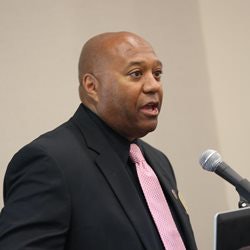 Dr. Edward J. Leach
Dr. Edward J. LeachAUSTIN, Texas — Over 1,300 community college faculty, administrators and staff gathered this week for the 37th annual National Institute for Staff and Organizational Development (NISOD) conference. With a renewed focus on student success and best educational practices, NISOD members took in technology, professional development and leadership sessions over Memorial Day weekend. According to new director Dr. Edward J. Leach, the organization seems to have weathered the storm from the 2012 retirement of the head of The University of Texas at Austin’s Community College Leadership Program for 41 years, John E. Roueche. In an interview with Diverse, Leach sees promise in the direction NISOD is headed. Q: As head of NISOD, what do we look forward to at this year’s conference? A: We have a great program this year. The preconference seminars on effective faculty evaluation planning and steering students toward success pathways attendees are enjoying. The awards dinner recognizing excellence and service for community college folks was also exciting. I also look forward to personally connecting with member affiliates to let them know that I am here for them and appreciate their research and service contributions to community colleges. Q: What would you say are the benefits of attending the NISOD conference? A: I would say the content we offer here has always been stellar and that continues to be what brings attendees back each year. Q: What trends are you seeing at community colleges that attendees are identifying that are different over the past year? A: Funding has always been a challenge that continues to come up with talking with community college practitioners, faculty members and administrators. We need to continue to find ways to combat funding challenges. Q: To that point, what do you think about the prospect of making community colleges free for students as the Obama administration has recently proposed? A: I like the idea of free community college, but I think there needs to be a concrete way to pay for it, considering Tennessee has opened that door. Schools in Chicago have also found a way, but logistically, how do you do it? That will also be a challenge. Q: With more community colleges offering bachelor’s degrees, do you think this changes the community college model? A: Yes, it changes the community college model, and adds to it. The community colleges that are doing this have identified a need. If there is a need, that is what community colleges do: address the needs of the students they are serving. At the same time, I hope they continue to remain open-door institutions and provide an additional opportunity to pursue higher education for all of those who walk through those doors. Q: President Obama recently announced that the My Brother’s Keeper Alliance will extend beyond his presidency the initiative focused on improving the lives of boys and men of color. How do you think this impacts community college students? A: There is definitely more than one thing that needs to be focused on before students of color even get to college, but it’s tough to ask the administration to focus on just one facet. A continued look at a multitude of issues, starting with the schools they are coming out of, family and community life, need to be addressed on a large scale. There are some colleges that are moving the needle. Q: What is the biggest misconception about community colleges? A: That they should be judged in the same manner as four-year institutions. Especially these legislators that want to place the same performance measures used on four-year institutions as ones used for community colleges. It is like [comparing] apples and oranges. Community colleges need to be assessed in a way that makes sense for community colleges. Not everyone comes to a community college to look for graduating. Some come to enhance their work situation; that might be different from what the state considers a successful outcome. Jamal E. Mazyck can be reached at [email protected] and on Twitter @jmbeyond7.















